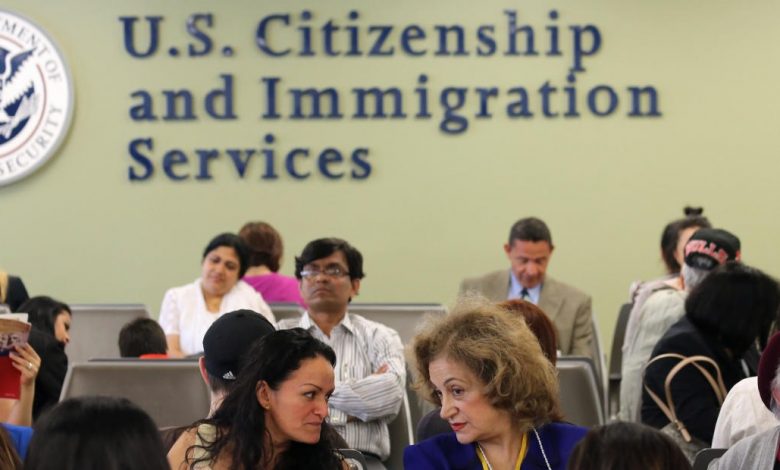
The federal agency that processes U.S. visas has announced it will avoid furloughing 70% of its staff next week but warned visa applicants to expect a long wait time.
“Averting this furlough comes at a severe operational cost that will increase backlogs and wait times across the board, with no guarantee we can avoid future furloughs, said Joseph Edlow, deputy director for policy at the U.S. Citizenship and Immigration Services (USCIS).
“A return to normal operating procedures requires congressional intervention to sustain the agency through fiscal year 2021,” he added.
More about this story from cbsnews…
U.S. Citizenship and Immigration Services (USCIS) on Tuesday announced it would abandon plans to furlough more than 13,000 employees next week, temporarily averting a scenario that would have crippled the processing of applications for green cards, work permits, U.S. citizenship and other immigration benefits.
In a message to employees obtained by CBS News, Deputy USCIS Director for Policy Joseph Edlow said the agency was able to avoid furloughing nearly 70% of its workforce because its financial situation has “improved somewhat” since the spring, when the coronavirus pandemic fueled an unprecedented drop in applications. Unlike most other federal agencies, USCIS is largely funded through the fees it charges.
Though applications have increased in recent weeks, Edlow said the agency is still projecting a budget shortfall heading into fiscal year 2021, which starts in October, and continue to require financial assistance from Congress.
“Although our situation has temporarily improved due to a modest increase in revenues, Congress must act on a long-term fix that will provide the necessary financial assistance to sustain the agency,” he told employees in an email.
Edlow warned of “cost-reducing” actions that could result in increased wait times and prolong the processing of certain cases, like citizenship applications, in the absence of congressional action. USCIS declined to make Edlow available for an interview, but in a statement sent to reporters, he said a future furlough remains a possibility.
“Our workforce is the backbone of every USCIS accomplishment. Their resilience and strength of character always serves the nation well, but in this year of uncertainty, they remain steadfast in their mission administering our nation’s lawful immigration system, safeguarding its integrity and protecting the American people, even as a furlough loomed before them,” Edlow said. “However, averting this furlough comes at a severe operational cost that will increase backlogs and wait times across the board, with no guarantee we can avoid future furloughs.”
USCIS, which is a division of the Department of Homeland Security, first informed Congress of its financial woes in the middle of May, requesting $1.2 billion in emergency funding and promising to repay the funds by imposing a 10% surcharge on applications.
However, in the ensuing months, a standoff between Congress and the Trump administration emerged over how USCIS should be rescued from a potential fiscal collapse. Lawmakers introduced several bills aimed at averting the furloughs, including one that passed the House over the weekend through unanimous consent, but no solution has received a greenlight from both chambers of Congress.
USCIS has maintained that the sole reason for the agency’s financial woes is the pandemic and its impact on applications. In the spring, the agency had to postpone in-person interviews, fingerprint and photo appointments, naturalization ceremonies and other services.
However, Democratic lawmakers, experts, former USCIS officials and current employees believe the agency’s fiscal crisis had been brewing well before the coronavirus crisis, fueled largely by the Trump administration’s restrictive immigration policies. An analysis by the non-partisan Migration Policy Institute shows that revenue from petition fees has declined in the past three consecutive fiscal years — a trend that ran parallel to dwindling petitions for programs the administration has limited or sought to dismantle entirely.
Though USCIS predicted in May a 61% decline in petition receipts through the end of September, applications and revenue increased in the summer.
The agency made over $800 million more in revenue and recoveries than originally anticipated in May, according to a letter last week from a bipartisan group of lawmakers in charge of committees with oversight over USCIS. Predicting that the agency will have $230 million to finance day-to-day operations going into fiscal year 2021 and that funding won’t run out until November, the lawmakers had urged USCIS leaders to delay the furloughs.
One of the lawmakers who signed the letter, California Congresswoman Lucille Roybal-Allard, the Democratic chair of the House Appropriations Subcommittee on Homeland Security, praised Tuesday’s announcement.
“USCIS has done the right thing by canceling its employee furloughs. I have been clear that USCIS has the funding it needs to keep operating at full capacity for at least the next several months,” Roybal-Allard said. “I look forward to continuing to work with USCIS to address any remaining funding shortfall while also introducing reforms to help avoid funding shortfalls in the future.”
One USCIS employee who requested anonymity to speak freely said the furloughs would have been unnecessary. The threat of the furloughs, however, will continue to have an impact on workforce morale, the employee added.
“People are just completely exhausted by the back and forth of it,” the employee told CBS News. “By the constant uncertainty. By the fact that the letter also indicates this is really just another stay. Execution still may come. The feeling that this was a fake furlough threat held over us as a bargaining chip and that we’re merely pawns.”
Lynden Melmed, who served as the top lawyer at USCIS between 2007 and 2009, said the agency will need to implement significant reforms to ensure it has a sustainable financial model going forward. This includes taking a “sharp look” at the effect that restrictive immigration policies have had on applications, he said.
“Their revenue issues took well over a year to develop,” Melmed told CBS News. “Notwithstanding the pandemic being the final drop, this scenario that they are facing now was a long time coming.”
Source: VOA News and CBS News







